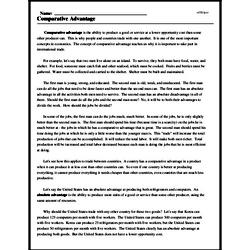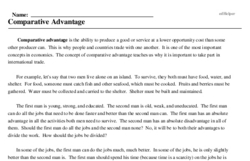Comparative Advantage
Comparative advantage is the ability to produce a good or service at a lower opportunity cost than some other producer can. This is why people and countries trade with one another. It is one of the most important concepts in economics. The concept of comparative advantage teaches us why it is important to take part in international trade.
For example, let's say that two men live alone on an island. To survive, they both must have food, water, and shelter. For food, someone must catch fish and other seafood, which must be cooked. Fruits and berries must be gathered. Water must be collected and carried to the shelter. Shelter must be built and maintained.
The first man is young, strong, and educated. The second man is old, weak, and uneducated. The first man can do all the jobs that need to be done faster and better than the second man can. The first man has an absolute advantage in all the activities both men need to survive. The second man has an absolute disadvantage in all of them. Should the first man do all the jobs and the second man none? No, it will be to both their advantages to divide the work. How should the jobs be divided?
In some of the jobs, the first man can do the jobs much, much better. In some of the jobs, he is only slightly better than the second man is. The first man should spend his time (because time is a scarcity) on the jobs he is much better at - the jobs in which he has a comparative advantage that is great. The second man should spend his time doing the jobs at which he is only a little worse than the younger man is. This "trade" will increase the total production of jobs that can be accomplished. It will reduce the total labor. It will make both men richer. Total production will be increased and total labor decreased because each man is doing the jobs that he is most efficient at doing.




